a few simple forms of english poems翻译
来源:学生作业帮助网 编辑:作业帮 时间:2024/04/30 08:06:51

a few simple forms of english poems翻译
a few simple forms of english poems翻译
a few simple forms of english poems翻译
几个简单的英语形式
一些简单的英语诗组成
英语诗歌的几种简单形式
人们写诗有着各种各样的理由。有些诗是为了叙事,或者说是描述某件事,并给读者以强烈的印象。而有些诗则是为了传达某种感情。诗人用许多不同格式的诗来表达自己的情感。本文只谈了几种格式比较简单的诗。
最早用英文写的诗是童谣。孩子们很小就学习童谣。像下边的这首童谣(A)至今仍然是常见的。这些童谣能使俏皮孩子们快乐,因为它们节奏感强并且押韵,而且重复多遍。这样就容易学,...
全部展开
英语诗歌的几种简单形式
人们写诗有着各种各样的理由。有些诗是为了叙事,或者说是描述某件事,并给读者以强烈的印象。而有些诗则是为了传达某种感情。诗人用许多不同格式的诗来表达自己的情感。本文只谈了几种格式比较简单的诗。
最早用英文写的诗是童谣。孩子们很小就学习童谣。像下边的这首童谣(A)至今仍然是常见的。这些童谣能使俏皮孩子们快乐,因为它们节奏感强并且押韵,而且重复多遍。这样就容易学,也容易背。通过童谣中的文字游戏,教孩子们学习语言。
(A)
小宝宝,别吵吵,
爸爸给你买个小哩鸟。
小哩鸟,不会唱,
爸爸给你买个钻石戒。
钻石戒,变成铜
爸爸给你买个小镜子。
小镜子,打破了,
爸爸给你买个小山羊。
小山羊,跑掉了。
爸爸今天再去买一只。
像(B)和(C)这样列举事物的清单诗是诗歌中最简单的一种,学生可以自己动手写。清单诗可以重复一些短语和韵脚(如B),但有一些也不是这样(如C)。
(B)
我看到鱼塘在燃烧
我看到鱼塘在燃烧,
我看到房子向地主哈腰,
我看到人高一丈八,
我看到茅屋在天郊,
我看到气球用铝做。
我看到棺材把死人抛。
我看到两只麻雀在赛跑,
我看到两匹马儿绣花包。
我看到姑娘像只猫,
我看到小猫戴花帽。
我看到有人在一旁瞄,
虽奇怪,但也把实情报。
(C)
我们的第一场球赛
我们本来会得冠军……
如果杰克踢进了那个球,
如果我们还有几分钟,
如果我们训练得更严格,
如果本把球传给了乔,
如果有大批球迷助威,
如果我死死盯住球,
如果我们头晚不熬夜,
如果我们没有太大意,
如果我们没有精疲力竭,
我们本来会得冠军……
如果我们再干得好一些!
另外,一种学生容易写的简体诗是由五行组成的,叫做五行诗。用五行诗,学生可以用少量的词语传递一幅动人的画面。请看下面的(D)和(E)两个例子。
(D)
兄弟
爱美,又爱运动
爱闹,爱叫,又爱笑
是我的朋友
也是我的敌人
(E)
夏天
困乏,刺激
干涸,枯萎,恐怖
周而复始
永无止境
俳句诗(Haiku)是一种日本诗,由17个音节组成。它不属英诗的传统形式,但是在说英语的人们中间,这种诗也是很流行的。它容易写,而且像五行诗一样,它可用很少的词语呈现出一幅清晰的画面,表达出一种特殊的感情。下面两首俳句诗下面的(F)和(G)就是由日文翻译而来的。
(F)
落下的花朵
回顾到树枝上。
瞧啊,是个蝴蝶!
(作者:moritake)
(G)
雪儿溶化了,
整个村庄充满着
欢乐的儿童。
(作者:Issa)
你知道吗?说英语的人也借另外一种亚洲诗,那就是中国的唐诗,许多唐诗已经翻译成英文了。这些诗都译成了自由体,说英语的人都喜欢模仿它。下面这首唐诗就是从中文译成英文的。
(H)
望夫石
王 健
望夫处,江悠悠。
化为石,不回头。
山头日日风复雨,
行人归来石应语。
Using Language
Listening,reading and discussing
我保留了夏天
Rod Mckuen
_________我把夏天留下,
全都交给了你。
当雪花儿初降时,
让冬天的早晨停住。
我把阳光留下,
万一你需要它。
在那远离黑暗的地方,
你的心灵会得到补养。
那年你芳龄十九,
我就珍藏了你的微笑。
等你长大成人以后,
才知道年轻勇敢的微笑的奥秘。
我不知道有什么办法,
帮你踏上你人生的旅程。
办法也许就在某处:
在白天结束的那个时辰。
如果你需要爱,
我会献上我所有的爱。
它也许能帮你踏上旅程,
直到你也找到属于你的爱。
收起
一些简单形式的英语诗歌
英文诗的一些简单形式
A FEW SIMPLE FORMS OF ENGLISH POEMS
There are various reasons why people write poetry. Some poems tell a story or describe something in a way that will give the reader a strong impression....
全部展开
A FEW SIMPLE FORMS OF ENGLISH POEMS
There are various reasons why people write poetry. Some poems tell a story or describe something in a way that will give the reader a strong impression. Others try to convey certain emotions. Poets use many different forms of poetry to express themselves. In this text, however, we will look at a few of the simpler forms.
Some of the first poetry a young child learns in English is nursery rhymes. These rhymes like the one on the right (A) are still a common type of children's poetry. The language is concrete but imaginative, and they delight small children because they rhyme, have strong rhythm and a lot of repetition. The poems may not make sense and even seem contradictory, but they are easy to learn and recite. By playing with the words in nursery rhymes, children learn about language.
A Hush, little baby, don't say a word, Papa's going to buy you a mockingbird. If that mockingbird won't sing, Papa's going to buy you a diamond ring. If that diamond ring turns to brass, Papa's going to buy you a looking-glass. If that looking-glass gets broke, Papa's going to buy you a billy-goat. If that billy-goat runs away, Papa's going to buy you another today.
One of the simplest kinds of poems are those like B and C that list things. List poems have a flexible line length and repeated phrases which give both a pattern and a rhythm to the poem. Some rhyme (like B) while others do not (like C).
B I saw a fish-portal all on fire
I saw a fish-pond all on fire,
I saw a house bow to a squire,
I saw a person twelve-feet high,
I saw a cottage in the sky,
I saw a balloon made of lead,
I saw a coffin drop down dead,
I saw two sparrows run a race,
I saw two horses making lace,
I saw g girl just like a cat,
I saw a kitten wear a hat,
I saw a man who saw these too,
And said though strange they all were true.
C Our first football match
We would have won ...
if Jack had scored that goal,
if we'd had just a few more minutes,
if we had trained harder,
if Ben had passed the ball to Joe,
if we'd had thousands of fans screaming,
if I hadn't taken my eye off the ball,
if we hadn't stayed up so late the night before,
if we hadn't taken it easy,
if we hadn't run out of energy.
We would have won ...
if we'd been better!
Another simple form of poem that students can easily write is the cinquain, a poem made up of five lines. With these, students can convey a strong picture in just a few words. Look at the examples (D and E) on the top of the next page.
D Brother Beautiful, athletic Teasing, shouting, laughing Friend and enemy too Mine
E Summer Sleepy, salty Drying, drooping, dreading Week in, week out Endless
F A fallen blossom Is coming back to the branch. Look, a butterfly!
( by Moritake)
G Snow having melted, The whole village is brimful Of happy children.
(by Issa)
Haiku is a Japanese form of poetry that is made up of 17 syllables. It is not a traditional form of English poetry, but is very popular with English writers. It is easy to write and, like the cinquain , can give a clear picture and create a special feeling using the minimum of words. The two haiku poems (F and G) above are translations from the Japanese.
H Where she awaits her husband On and on the river flows. Never looking back,Transformed into stone.Day by day upon the mountain top,wind and rain revolve.Should the traveller return,this stone would utter speech.,
(by Wang Jian)
Did you know that English speakers also enjoy other forms of Asian poetry - Tang poems from China in particular? A lot of Tang poetry has been translated into English. This Tang poem (H) is a translation from the Chinese.
With so many different forms of poetry to choose from, students may eventually want to write poems of their own. It is easier than you might think and certainly worth a try!
收起
英语诗歌的一些简单的形式